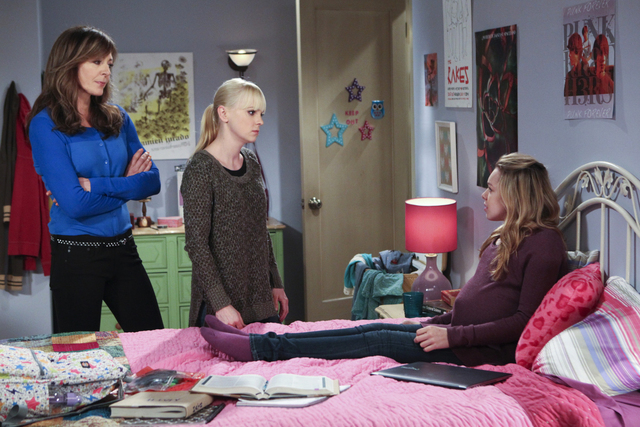Chuck Lorre’s sitcom ‘Mom’ adopts serious tone

LOS ANGELES — A pregnant teenager, the daughter of an unmarried mother and granddaughter of another, is repeating family history. Does she decide to keep her baby and do her immature best to raise it, or choose adoption for her offspring?
That quandary anchors the season finale of CBS’ “Mom” (9:30 p.m. EDT, Monday) a freshman sitcom that has balanced punch lines and pathos in tackling alcoholism, cancer, broken families and other weighty themes.
Any one of them would have fitted what TV sitcoms once somberly heralded as “a very special episode,” but they are the bread-and-butter of “Mom,” starring Anna Faris and Allison Janney.
It’s a daring approach and, given its lineage, a surprising one: “Mom” was hatched by Chuck Lorre, the executive producer behind “Two and a Half Men,” a show that traffics in superficial raunchiness, and the smartly frothy “The Big Bang Theory.”
The women of “Mom” are winning but brittle and complex characters, deftly played by Faris as Christy, the mother of 16-year-old Violet (Sadie Calvano) and a son (Blake Garrett Rosenthal) from another relationship, and Janney as Bonnie, Christy’s mom and a soul mate in battling alcoholism.
“Mom” has its own comedic pacing as well as content. Laughs are delivered at a pace more measured than that of a typical sitcom, giving emotions time to rise and fall convincingly.
For Lorre, “Mom” represents a return to the kind of real-life nuance that he explored in the early 1990s as a writer on “Roseanne” and in a sitcom he created about another single mom with addiction issues, “Grace Under Fire.”
He got “turned in a different direction,” as Lorre put it, with his hits “Two and a Half Men” (which developed its own real-life subplot, ex-star Charlie Sheen’s ugly public clash with Lorre and Warner Bros. Television) and “The Big Bang Theory.”
“Mom,” which Lorre created and produces with Eddie Gorodetsky and Gemma Baker, was the way back. The show, which ranked No. 20 in recent weekly ratings among advertiser-favored young adult viewers, has been renewed for next season.
“I really wanted ‘Mom’ to be an opportunity to take chances, to see if storytelling and character development could be expanded, and maintain the promise that it’s a comedy,” Lorre said.
There’s no “high concept” and nothing remotely funny in breast cancer or seeing your mom relapse into alcoholism, he said, “but the challenge of it, it seemed worth trying.”
The pregnancy plot that forces Violet to confront what’s best for her and her baby has been particularly delicate, Lorre said, including the relatively rare depiction of adoption from the birth mother’s point of view.
(Faris, coincidentally, played an unwed teenage mother on “Friends” in 2004 whose twins are adopted by Monica and Chandler, series stars Courteney Cox and Matthew Perry.)
The option of abortion was “discussed obliquely but within the boundaries of what CBS will allow us,” Lorre said.
The National Council for Adoption, which screened the “Mom” episodes, lauded the series for pursuing “an adoption story line in an in-depth way that isn’t often done,” according to a statement from the group’s Megan Lindsey.
Lorre’s cast relishes what he’s aiming for with “Mom.”
“I particularly love comedy that is rooted in real stuff and pain … when it’s all messy and mixed together. That satisfies me as an actor,” said Janney, a four-time Emmy-winner for “The West Wing.”
Faris said the show’s range allows her to reach emotional depths and still experience “the joy of making comedy.”
“As an actor who’s known for comedy, I love being able to stretch my legs a bit,” she said in an email. “It took me by surprise — I guess I was really naive — how much our industry separates the dramatic and comedic worlds.” Faris recalled how drama auditions were tough to get after she appeared in “Scary Movie.”
That Lorre has chosen a female-centric series as his incubator for experimentation should come as no surprise.
“For any writer working on any show, it’s much more interesting to write for women because they’re more empathetic, they’re more compassionate, more articulate, more willing to express their feelings,” he said. “Writing for women is an opportunity to express yourself as a writer in ways that you simply can’t do with men.”
———
Online:
http://www.cbs.com
———
Lynn Elber is a national television columnist for The Associated Press. She can be reached at lelberap.org and on Twitterlynnelber.